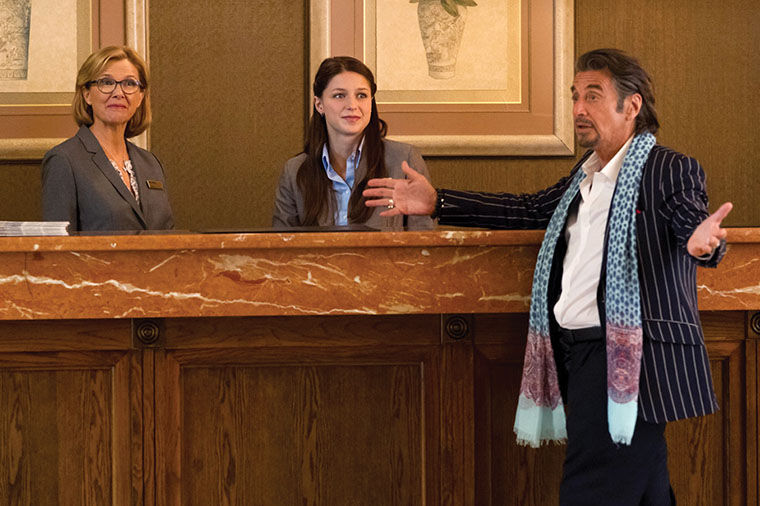Pacino sells out ‘Danny Collins’ to fans his own age
Photo courtesy of Hopper Stone/Bleecker Street
Danny Collins
March 30, 2015
“Danny Collins”—a movie about an aging rock star—has a running joke that the film’s lead character and target audience belong to the same age demographic.
The ‘60s brought a wave of films catering specifically to a younger audience, something that has still not changed. Now, 50 years later, that same generation has caused a shift in Hollywood. Films for older audiences, including works such as “The Best Exotic Marigold Hotel” and “Quartet” frequently feature big-name actors of generation appearing as older characters.
“Danny Collins,” screenwriter Dan Fogelman’s directorial comedy debut, follows a musician on a quest to come to peace with his artistic identity and his estranged son, all prompted by a misplaced letter from John Lennon. Ironically, the titular character, an artist who has sold out his entire career and is attempting to change, is played by Al Pacino (“The Godfather,” Insomnia”)—a talented actor with a revered career, now selling out by appearing in films like this.
“Danny Collins” is reflective of the shift in Hollywood toward marketing films to aging baby boomers. The movie is not exclusively intended for people 50 or older, but those are the majority of the viewers in the theater.
The film may not have knee-slapping hilarity, but it certainly is entertaining. It never takes itself too seriously or drags moments out for longer than necessary, making it a pleasure for the viewer. Although it does get predictable and boring at moments, the film’s biggest sin is being simply unmemorable.
The filmmakers enjoy portraying Collins’ lavish lifestyle: sex, coke, booze, private jets and sports cars. It is entertaining to explore this world, but it is a world audiences have seen before in any other film about an aging rock star, such as “Get Him To The Greek” and “This Must Be the Place.” The washed up rock star is not new.
Despite cliché characters, “Danny Collins” ends exactly when it needs to—a rarity in contemporary Hollywood films. The film ends on a hopeful note but also leaves unanswered questions in an intriguing manner, and that ambiguity is appreciated by modern audiences.
Because the film’s plot revolves around John Lennon, the film makes excellent use of its soundtrack by featuring much of Lennon’s solo work. At times it is too obvious, but it is still a strong element that classic rock lovers can enjoy.
The wildly entertaining Pacino is the glue that holds this film together. With his ridiculous outfits and even more ridiculous Jersey accent, Pacino has fun with his character. The strongest moments in the film were during scenes that allowed Pacino to just be Danny Collins, and the film could have benefitted from more of those bits.
The film also includes great performances from actors such as Christopher Plummer (“A Beautiful Mind”), who plays Collins’ groovy manager. His gravelly voice could put even the most restless hearts to sleep. Annette Bening (“American Beauty”) does solid work as a hotel manager Collins pines for. Collins’ granddaughter Hope, played by Giselle Eisenberg (“Wolf of Wall Street”), is more exciting than most young characters get to be. Jennifer Garner (“Dallas Buyers Club,” “Juno”) plays Collins’ daughter-in-law, and she does so with the same facial expressions she has used for every one of her films. It may be due to her flakiness, but Garner’s character seems completely bland and does absolutely nothing for the plot.
The film offers a refreshing break from the slew of action films clogging theaters. “Danny Collins” may be unmemorable, but it is a painlessly entertaining two hours.








